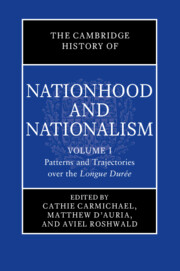Book contents
- The Cambridge History of Nationhood and Nationalism
- The Cambridge History of Nationhood and Nationalism
- The Cambridge History of Nationhood and Nationalism
- Copyright page
- Contents
- Figures
- Contributors
- General Introduction
- Part i The Politics of Ethnicity, Nationhood, and Belonging in the Settings of Classical Civilizations
- Part ii Paradigm Shifts and Turning Points in the Era of Globalization, 1500 to the Present
- 7 Colonial Expansion and the Making of Nations: The Spanish Case
- 8 The Reformation and National Identity
- 9 Europe’s Eighteenth Century and the Quest for the Nation’s Origins
- 10 Empire, War, and Racial Hierarchy in the Making of the Atlantic Revolutionary Nations
- 11 The Rise of the Charismatic Nation: Romantic and Risorgimento Nationalism, Europe, 1800–1914
- 12 Revolution and Independence in Spanish America
- 13 A Tale of Two Cities: The American Civil War
- 14 The Cycle of Inevitability in Imperial and Republican Identities in China
- 15 Colonial Subjects and the Struggle for Self-Determination, 1880–1918
- 16 The First World War
- 17 Anticolonialism and Nationalism in the French Empire
- 18 Patriotism in the Second World War: Comparative Perspectives on Countries under Axis Occupation
- 19 Decolonization and the Cold War
- 20 1968: The Death of Nationalism?
- Conclusion to Part II
- Index
- References
13 - A Tale of Two Cities: The American Civil War
from Part ii - Paradigm Shifts and Turning Points in the Era of Globalization, 1500 to the Present
Published online by Cambridge University Press: 27 October 2023
- The Cambridge History of Nationhood and Nationalism
- The Cambridge History of Nationhood and Nationalism
- The Cambridge History of Nationhood and Nationalism
- Copyright page
- Contents
- Figures
- Contributors
- General Introduction
- Part i The Politics of Ethnicity, Nationhood, and Belonging in the Settings of Classical Civilizations
- Part ii Paradigm Shifts and Turning Points in the Era of Globalization, 1500 to the Present
- 7 Colonial Expansion and the Making of Nations: The Spanish Case
- 8 The Reformation and National Identity
- 9 Europe’s Eighteenth Century and the Quest for the Nation’s Origins
- 10 Empire, War, and Racial Hierarchy in the Making of the Atlantic Revolutionary Nations
- 11 The Rise of the Charismatic Nation: Romantic and Risorgimento Nationalism, Europe, 1800–1914
- 12 Revolution and Independence in Spanish America
- 13 A Tale of Two Cities: The American Civil War
- 14 The Cycle of Inevitability in Imperial and Republican Identities in China
- 15 Colonial Subjects and the Struggle for Self-Determination, 1880–1918
- 16 The First World War
- 17 Anticolonialism and Nationalism in the French Empire
- 18 Patriotism in the Second World War: Comparative Perspectives on Countries under Axis Occupation
- 19 Decolonization and the Cold War
- 20 1968: The Death of Nationalism?
- Conclusion to Part II
- Index
- References
Summary
The short version of the history of nationalism and America’s mid-nineteenth-century civil war (1861–1865) may best be explained as a tale of two cities. Not, as one might suppose, the capitals of the Union and the Confederacy, Washington and Richmond, but two cities each of which was situated some four hundred miles from their warring sides’ respective capitals: Boston and Charleston. Arguably, it was in these cities that the essence of the national sentiments that motivated each side was most concentrated: in the case of the Union, to seek to maintain the federal compact and, in the case of the Confederacy, to destroy it. But this is also a story of alternative nationalist approaches. The Union and the Confederacy, respectively, inhabit what Christopher Wellman juxtaposes as the two camps of political theorizing on the subject of states, nations, and secession: the “statist” and the “nationalist.”
Keywords
- Type
- Chapter
- Information
- The Cambridge History of Nationhood and Nationalism , pp. 281 - 300Publisher: Cambridge University PressPrint publication year: 2023

